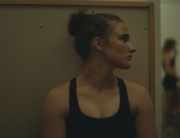Writer/director Iram Haq vividly fictionalizes her tense adolescence with her Pakistani immigrant family in Norway through What Will People Say? More than 25 years later, the anger at her family’s treatment of her dominates, compared to how matter-of-factly those years were described in her sort-of prequel, her debut film I Am Yours (2013).
At 16 years old, Nisha (the wonderfully expressive Maria Mozhdah) grabs typical teenage fun with her Norwegian school friends. Her father, Mirza (Adil Hussain), her mother (Ekavali Khanna), and her dutiful medical school–bound older brother Amir (Rohit Saraf) are much more constrained by their immigrant community’s approval. (There are repeated images of their neighbors looking down warily from windows and across streets when she goes by.)
After her father catches her making out with her Norwegian boyfriend Daniel in her bedroom, the family brings about her banishment with alacrity. They force her onto a ferry, plane, and then a train to the restrictions of her more conservative extended family in Pakistan, whom she has never met and where she has never lived. (This section was filmed in the Muslim communities of northwestern India). To assuage the family’s reputation, her grim aunt and uncle are determined to curb her wild, Western ways. They burn her passport and lock all the doors at night. The limits to her running away are made very clear.
A year later, Nisha’s spirit seems to be a model, modest Muslim teenager. She only goes out to school and to the market with her aunt. Then her flirtatious cousin, Asif (Ali Arfan), tempts her to rebel by sneaking out at night. What might be seen as a minor adolescent frolic back in Norway turns into something far more serious, the cruel public shaming of Nisha by corrupt policemen. Her parents back in Norway are mortified, almost beyond repair.
When the camera focuses on her father’s angry face, the fine Indian actor Hussain adds considerable emotional conflict to an unfortunately one-dimensional patriarch, so that the audience can believe he does love her. Haq emphasizes, as she did in her earlier film, that it is the women, the mothers, and the aunts who are the bulwarks who insist on and maintain the strict societal standards and forced marriages. Nisha and her father are left with only extreme options for her future.
In interviews, Haq says that while this is based on her own experiences at age 14, she has added considerable fictionalization (perhaps accounting for some glossed-over impracticalities). While she has had no contact with her Pakistani relatives since then, she did make up with her father after 25 years when he apologized to her a couple of years before he died, and he approved of her plans to make this film. While there are legitimate concerns that this could inflame Islamophobia or anti-immigrant biases for its portrayal of what could be called “honor crimes,” this unique film emotionally touches upon issues in some first-generation immigrant communities in the West from the point of view of the second generation.

















Leave A Comment